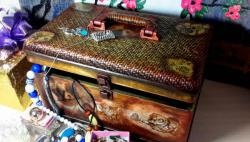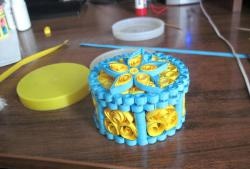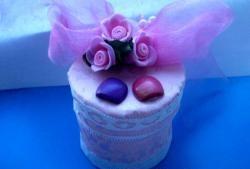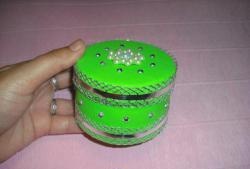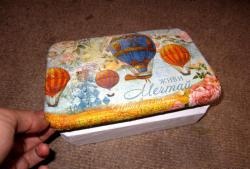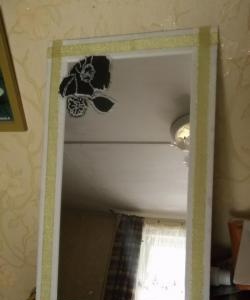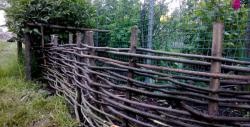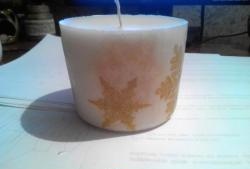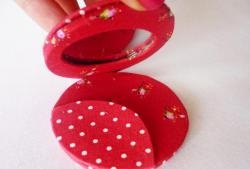Remaking a box using different decorative techniques
Many women keep old things for years that they don’t even dare throw away, and they are no longer suitable for everyday use. For example, painted wooden boxes. But any old thing can easily be given a second life! If your jewelry and costume jewelry are stored in many different boxes, then your grandmother's box can become the center of unity of the things dear to your heart. Of course, after a thorough redesign of its external and internal content. A little patience and time, minimum costs and maximum pleasure will be provided!
Materials for work:
1. Wooden box – 1 piece;
2. Beads - in quantity around the perimeter of the bottom and lid of the inside of the box;
3. Velvet paper – 2 sheets;
4. Craquelure varnish – 1 jar;
5. Color paper printout – to cover the sides and top of the box;
6. PVA glue – 1 pencil;
7. Solvent, sandpaper, brush, scissors, paints, skewer for dot painting, knife for cutting paper, eye shadow in the color of the printout, plasticine spatula, liquid nails glue.
Stages of work:
The first stage: we remove the former beauty from the surface.
To make it easier to remove the painted design, it is necessary to remove the top varnish fixing layer with a solvent. We moisten a cotton swab with any solvent and thoroughly wipe the entire box with it.
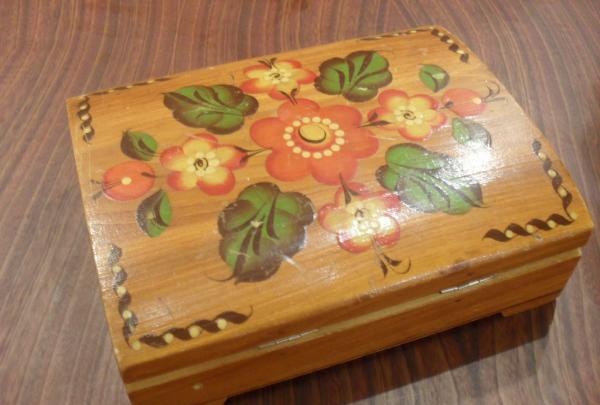
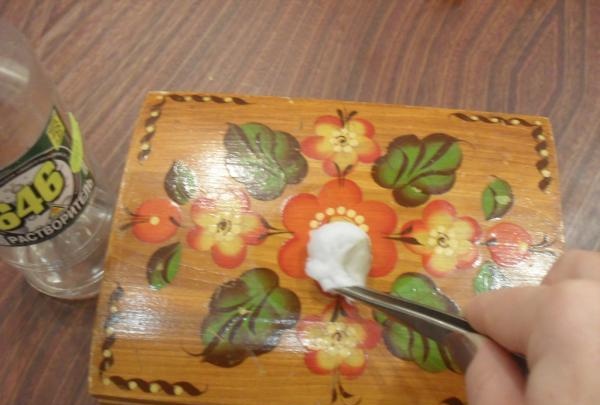
After the solvent has dried, we remove the remnants of its former luxury with sandpaper. Clean until the surface is smooth.
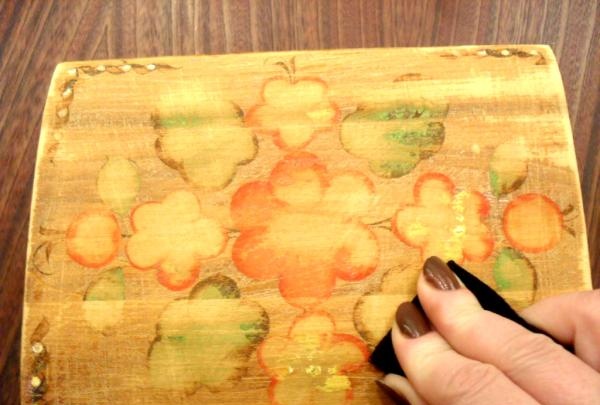
Second stage: preparing the base.
When using dark tones for the base, they can be applied pure. If the base is light, then using pure white will lead to a dirty tint after applying the varnish. Therefore, we dissolve white in a drop of ocher color.
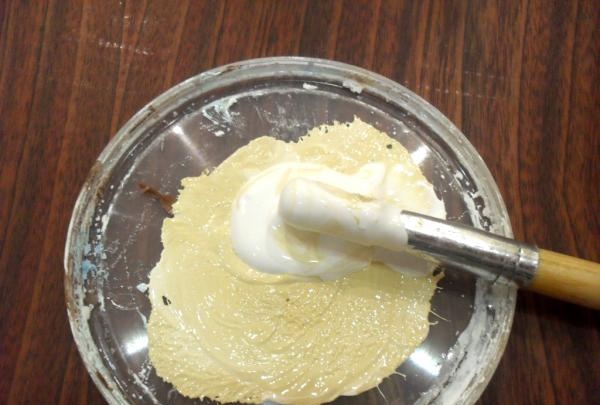
Apply a couple of layers of gouache paints to the entire surface of the box.
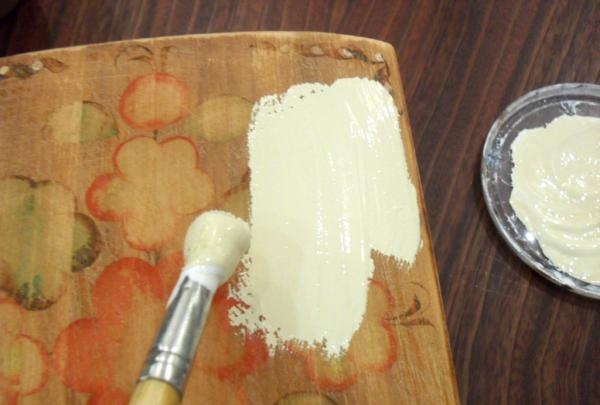
Let each layer dry thoroughly.
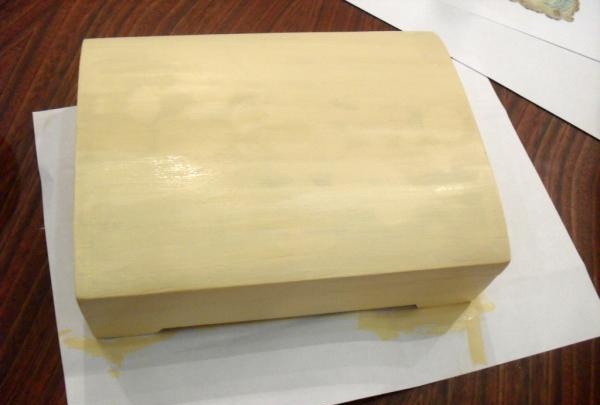
Third stage: imitate decoupage.
In the absence of suitable beautiful decoupage napkins, you can use color printouts of your favorite designs. In the presented version, colored borders are used for the background of the side parts of the box, and a combined frame and design are used for the front side.
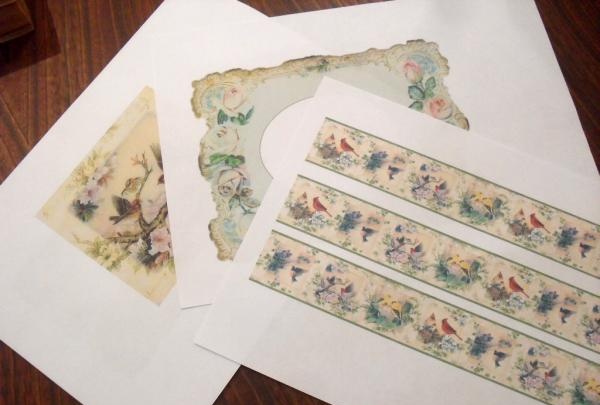
We cut off unnecessary points from the printouts.
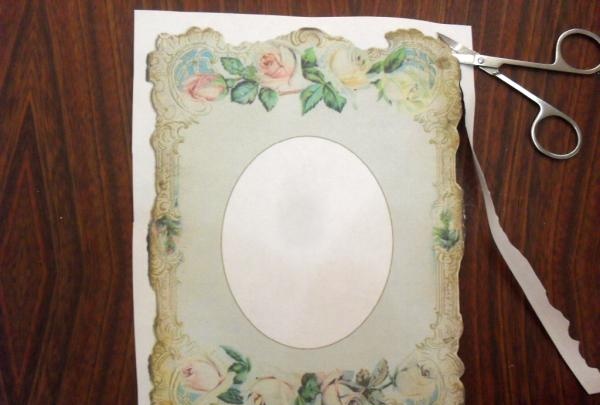
Combine the frame and the drawing.
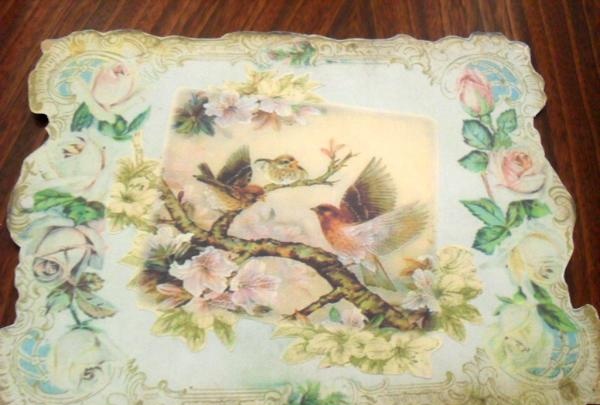
Apply a thick layer of PVA glue to the back side.
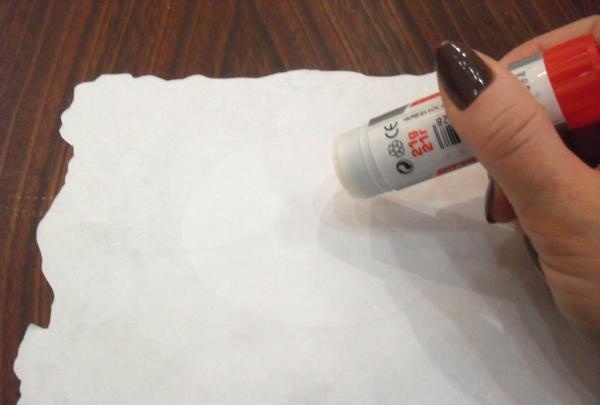
We press it tightly to the surface of the box, carefully smoothing every millimeter of the pattern.
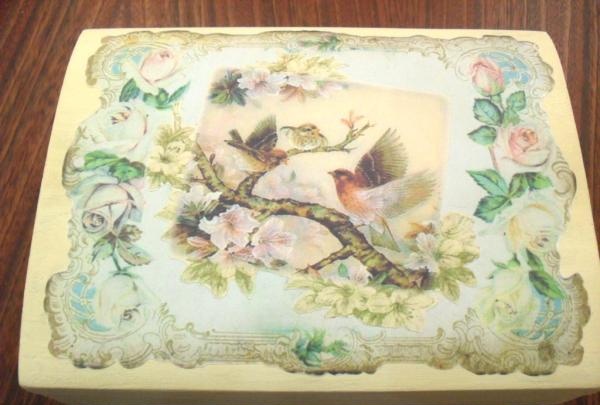
Close the box tightly and attach the printed borders to the sides.
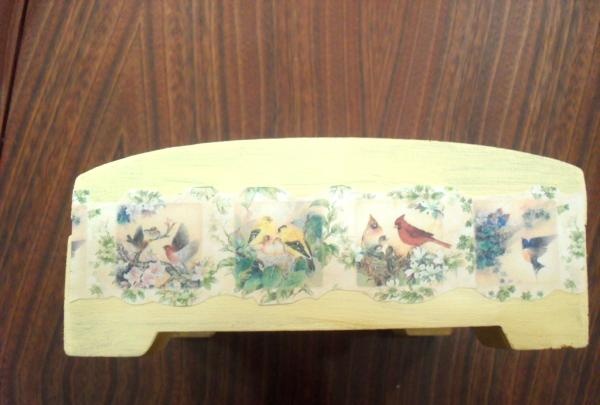
Using a paper knife, carefully cut through the junction of the lid and the box.
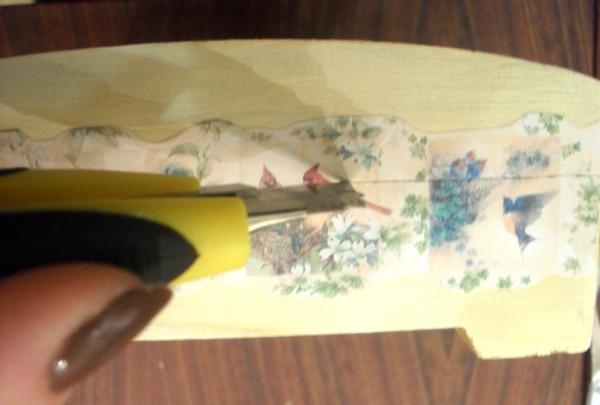
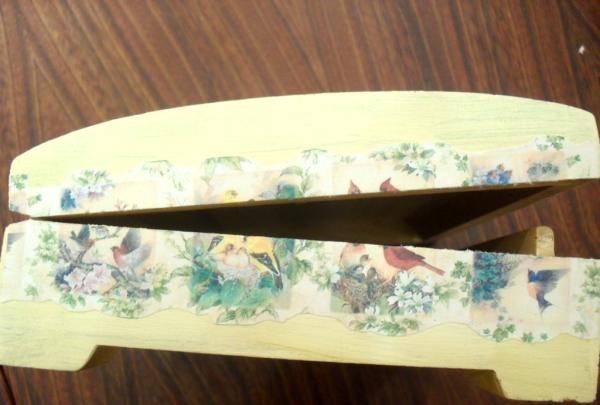
So that the print does not look like a separate existing spot, we tint the areas of the box free from the design with green eye shadow.
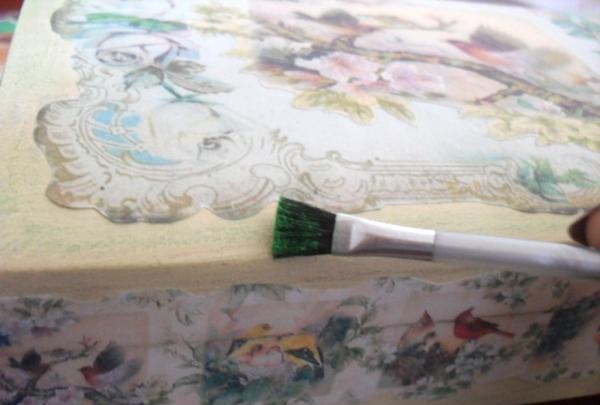
Fourth stage: imitate dot painting.
Using a plasticine spatula, apply “golden mesh” to the parts of the box that are not covered with prints. To do this, lightly touch the surface of the “golden” paint and press the spatula against the box, drawing curved lines first in one direction, then in the other. The mesh turns out crooked in places, but decoupage varnish will disguise this defect.
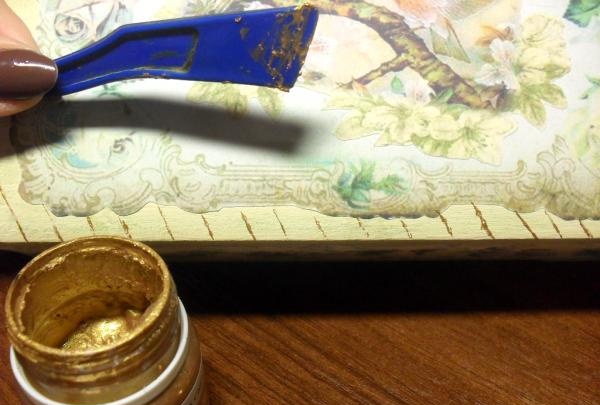
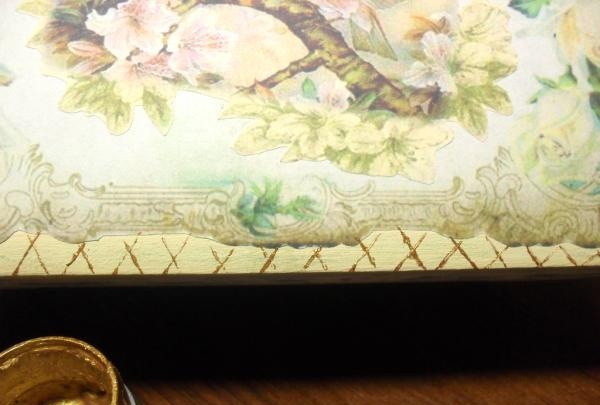
Using a skewer for applying dot painting, we apply dots to the joints of oblique gold lines. If you don’t have a special skewer, you can use the back of a thin brush or a sushi stick.
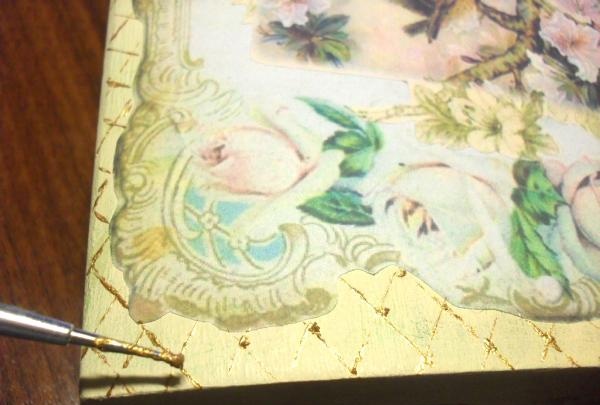
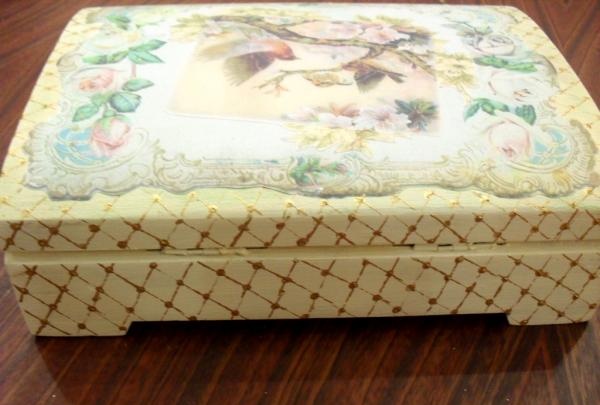
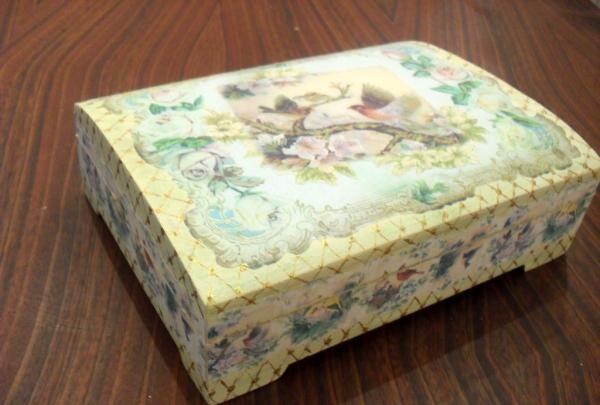
Fifth stage: multiple varnishing.
We cover the entire surface of the box with acrylic clear varnish in several layers. At this stage of work, you will have to patiently apply varnish to each side of the box separately to avoid the formation of smudges. Dry each layer of varnish thoroughly. There must be at least 2 layers.
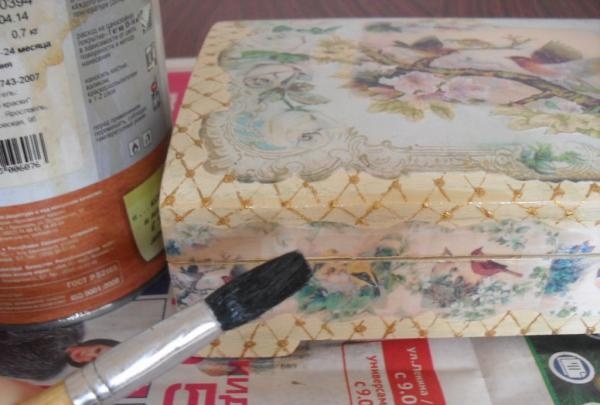
After the last layer of acrylic varnish has dried, apply a thick layer of craquelure varnish (for beginners: craquelure varnish is sold in art stores, to form rough and large cracks it is better to use a craquelure pair, apply in one direction, moving the brush over the area of application only once). Let's dry it.
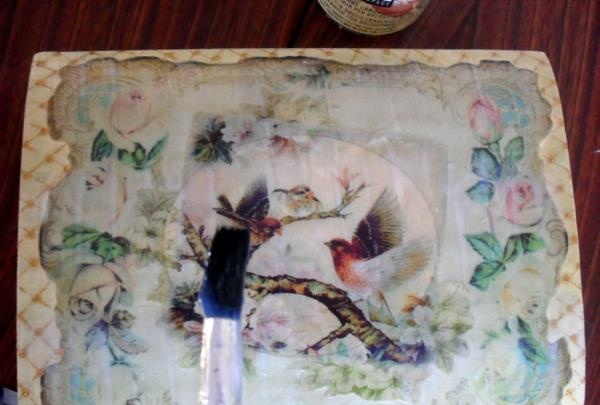
To highlight cracks more clearly, they can be carefully rubbed by dipping your finger in paint (ocher) and gently running it along the surface in both directions.
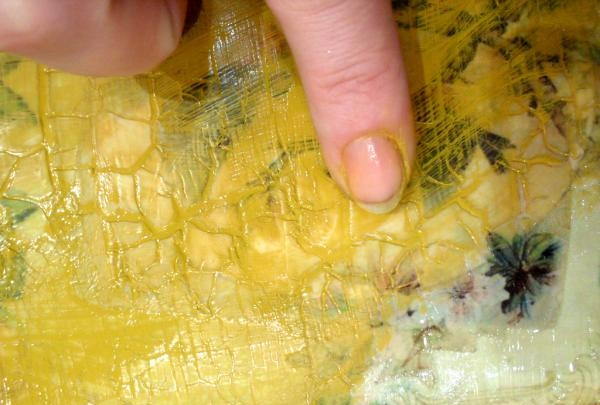
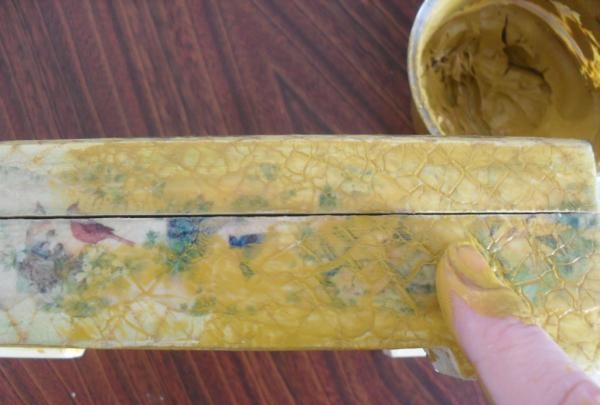
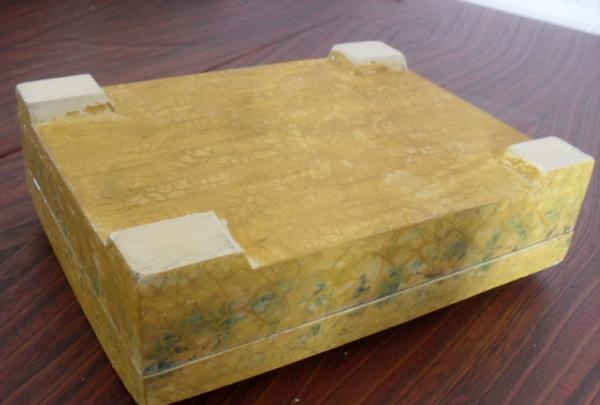
After the paint has dried in the cracks, soak a cotton pad with water and remove excess paint.
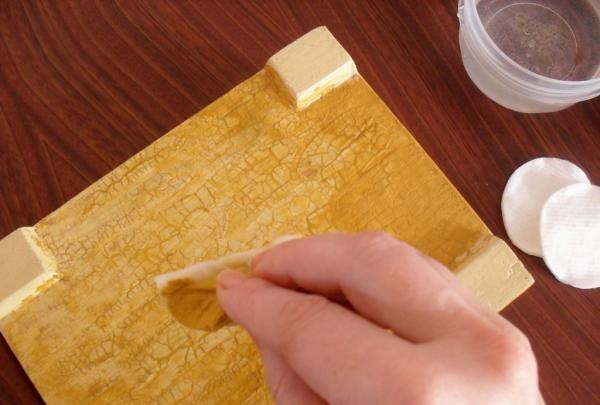
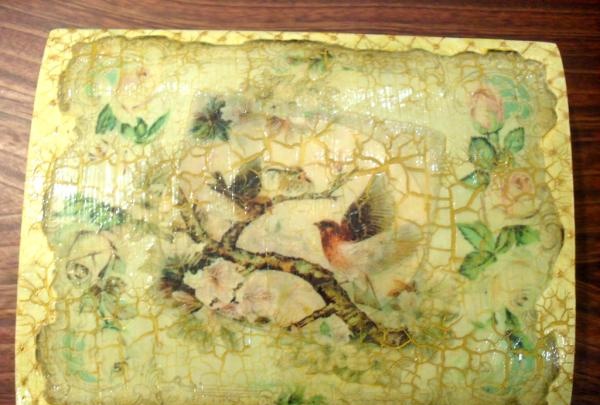
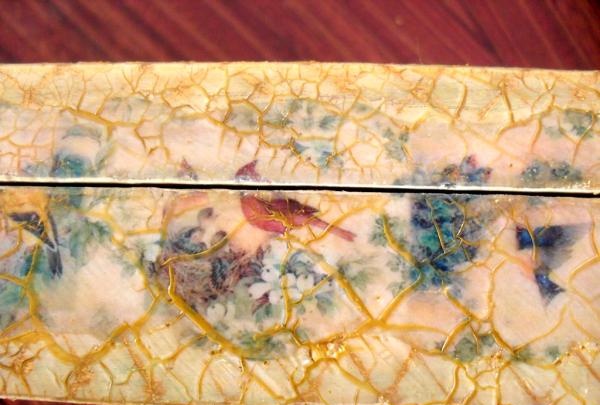
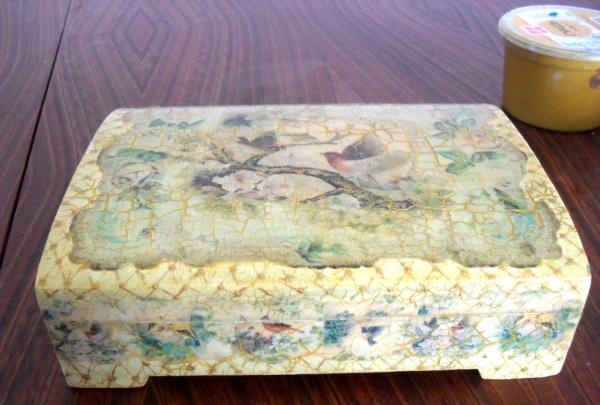
We varnish the entire box with acrylic varnish.
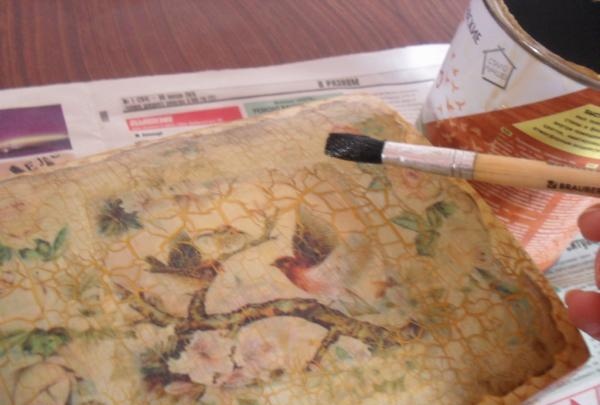
Sixth stage: paint the inner side parts.
We apply gouache paints to the sides of the inner surface of the box.
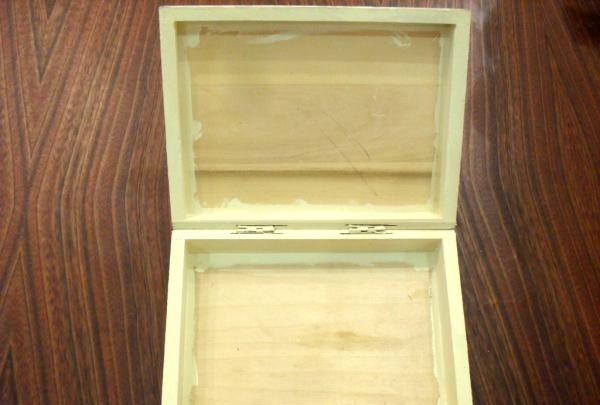
We paint the outer sides, imitating a dotted pattern. At the same time, we “mask” the convex part of the fastener with “golden” strokes.
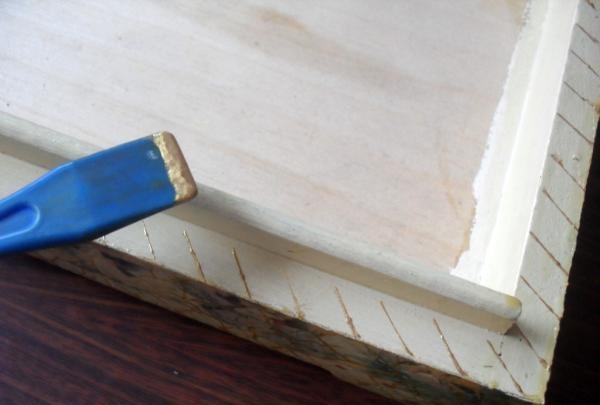
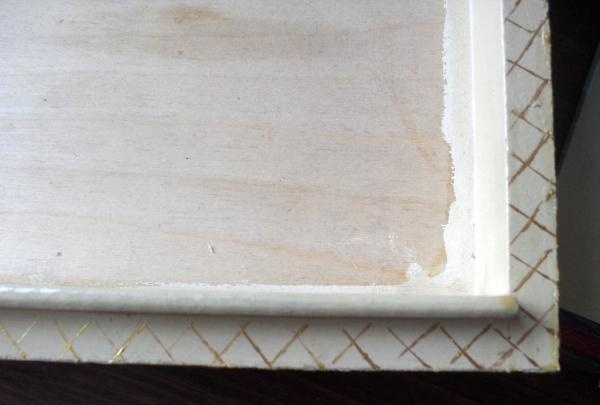
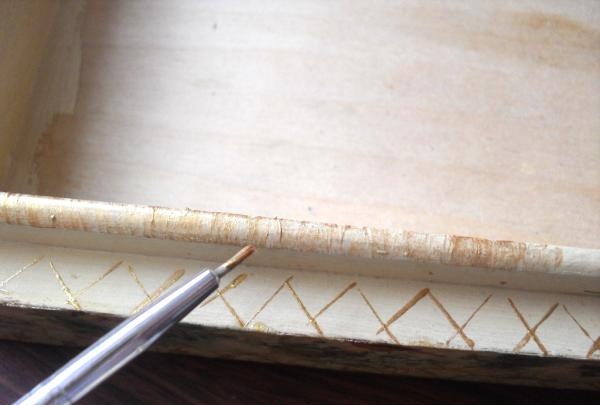
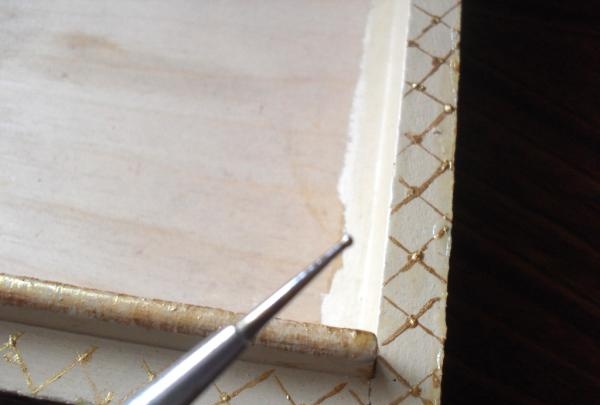
We shade the inner sides with “gold”, applying arbitrary brush strokes.
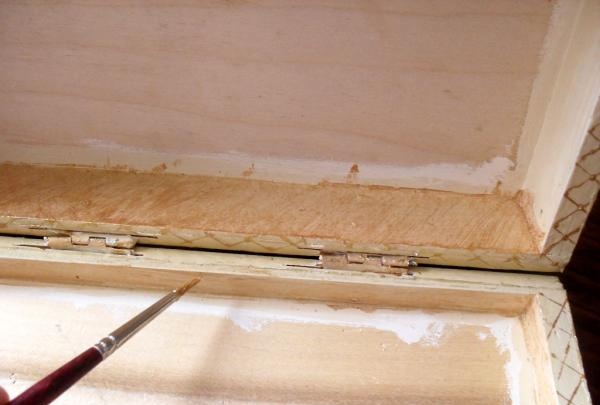
Seventh stage: give the surfaces a velvety feel.
From velvet paper we cut out parts according to the size of the bottom and lid of the inner parts of the box. From the remnants of printed borders, we select several motifs and cut them out.
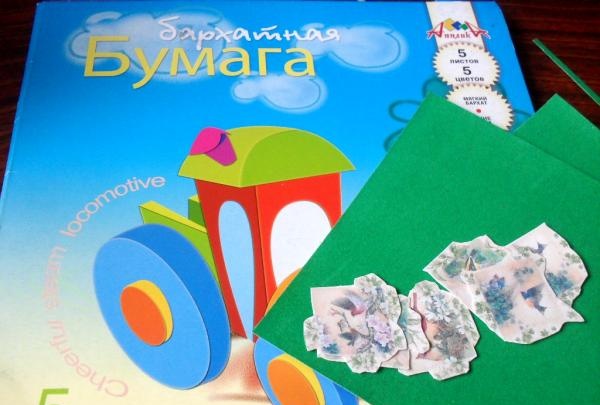
On the part of the velvet paper that we will attach to the lid, we apply cut out border motifs, forming their location.
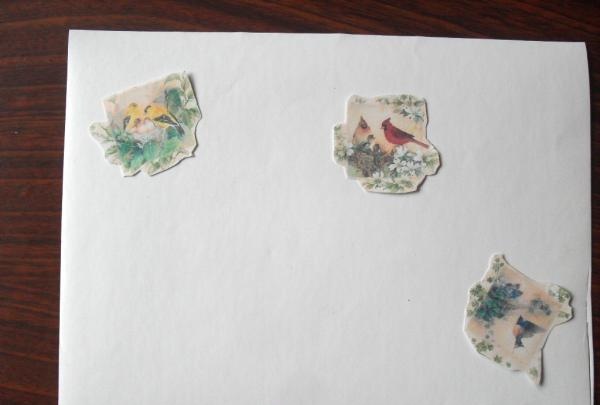
We turn the motifs over and trace them along the contour.
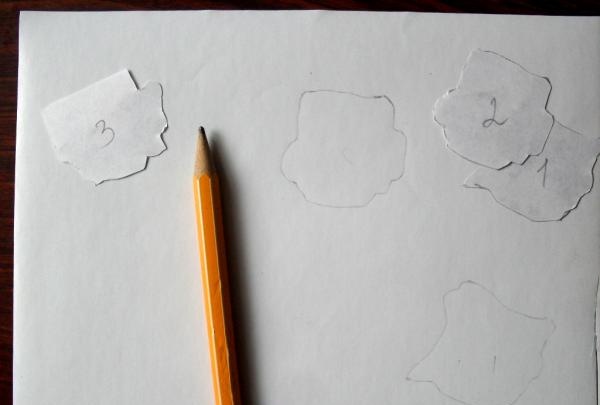
Cut it out.
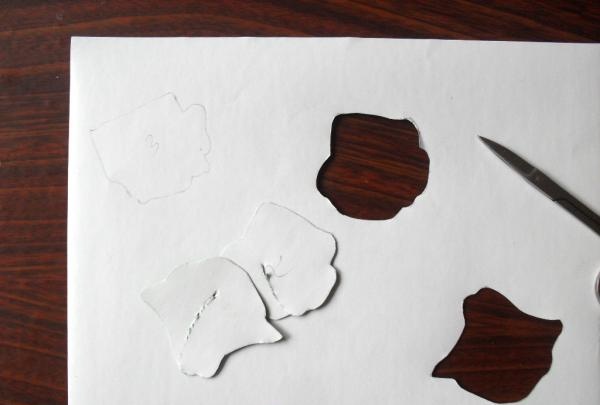
We apply the velvet to the box and trace the places of the cuttings.
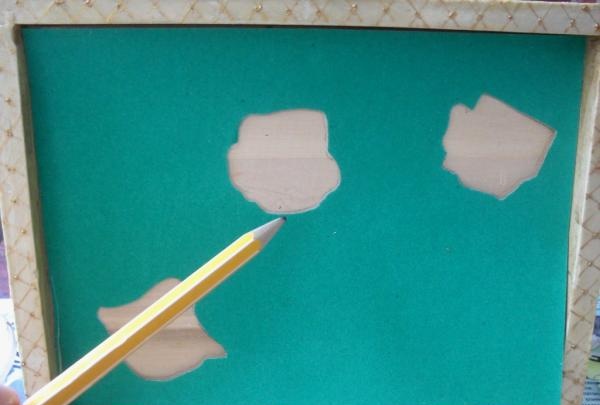
We glue the cut out motifs with PVA in pre-determined places.
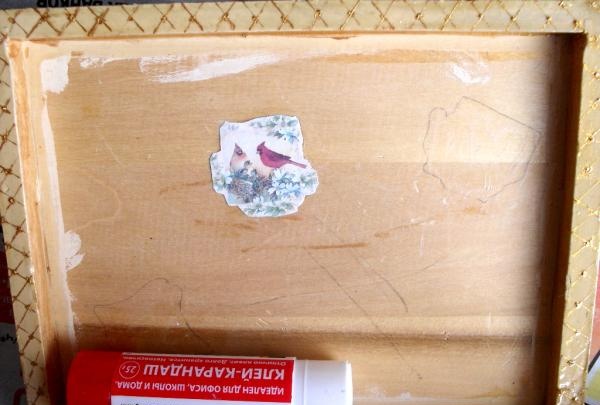
We cover them with acrylic varnish in two layers.
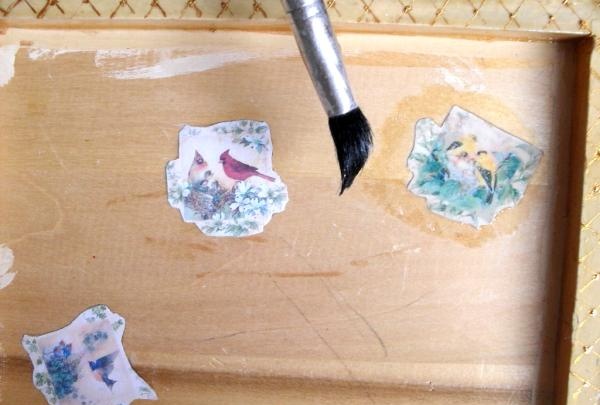
We insert the velvet, having previously applied a thick layer of PVA to its back surface. Smooth out thoroughly. Similarly, we glue the bottom of the box with velvet.
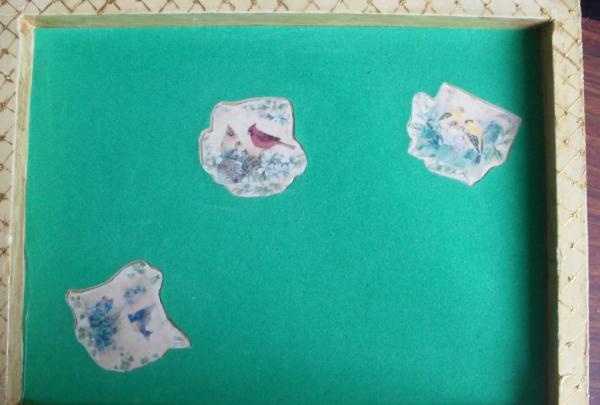
We decorate the junction of the cut out motif and the velvet paper with “golden” dots.
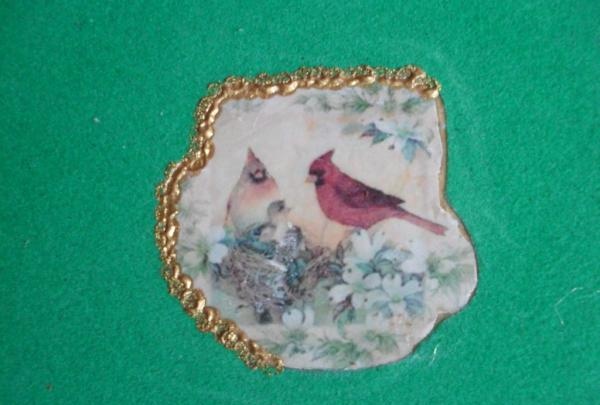
Eighth stage: mask the joint.
To disguise the junction of the velvet paper and the “golden” sides of the box, you can use beads glued with “liquid nails” glue.
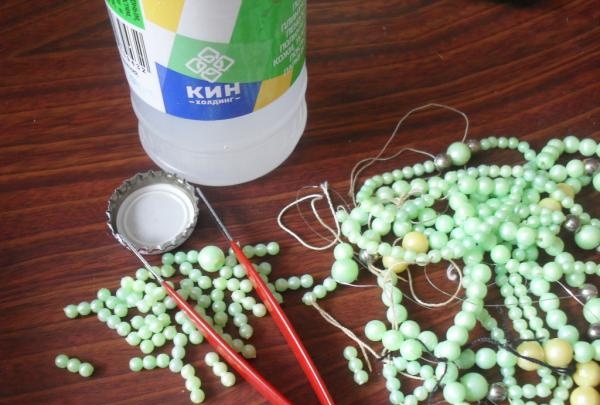
After pouring glue into a small container, dip the beads into it.
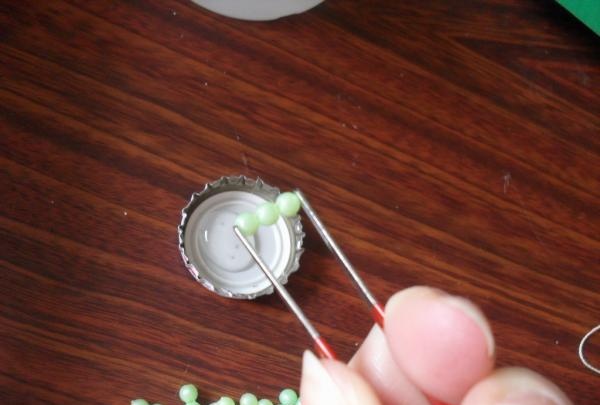
Gently press the beads into the joint. In the corners you can use single large beads.
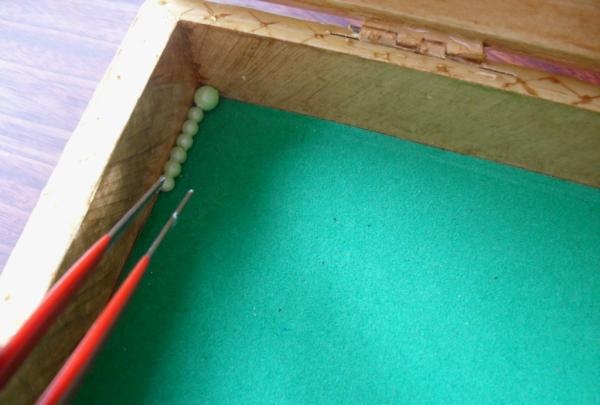
Glue beads around the entire perimeter of the bottom and lid.
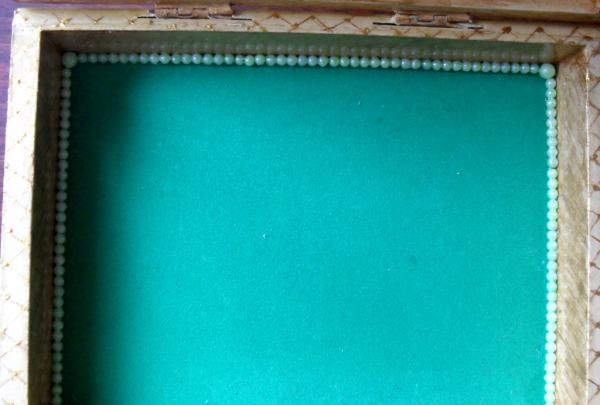
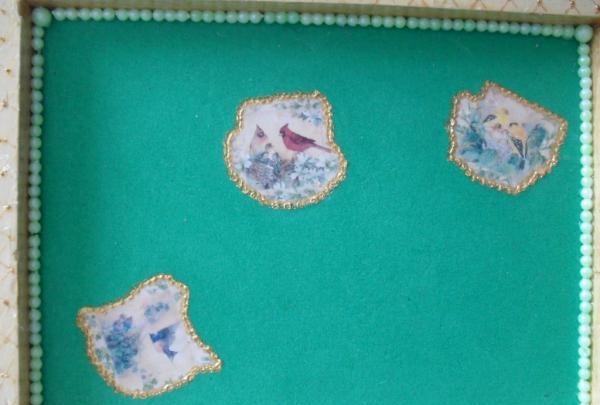
This is the antique box we end up with. Very similar to the one that could have been passed down from generation to generation by a noble grandmother.

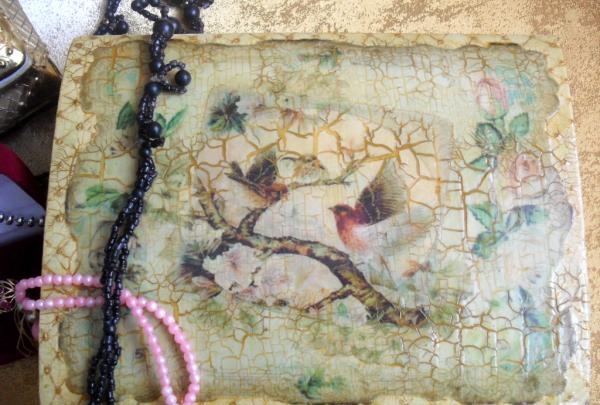
Materials for work:
1. Wooden box – 1 piece;
2. Beads - in quantity around the perimeter of the bottom and lid of the inside of the box;
3. Velvet paper – 2 sheets;
4. Craquelure varnish – 1 jar;
5. Color paper printout – to cover the sides and top of the box;
6. PVA glue – 1 pencil;
7. Solvent, sandpaper, brush, scissors, paints, skewer for dot painting, knife for cutting paper, eye shadow in the color of the printout, plasticine spatula, liquid nails glue.
Stages of work:
The first stage: we remove the former beauty from the surface.
To make it easier to remove the painted design, it is necessary to remove the top varnish fixing layer with a solvent. We moisten a cotton swab with any solvent and thoroughly wipe the entire box with it.


After the solvent has dried, we remove the remnants of its former luxury with sandpaper. Clean until the surface is smooth.

Second stage: preparing the base.
When using dark tones for the base, they can be applied pure. If the base is light, then using pure white will lead to a dirty tint after applying the varnish. Therefore, we dissolve white in a drop of ocher color.

Apply a couple of layers of gouache paints to the entire surface of the box.

Let each layer dry thoroughly.

Third stage: imitate decoupage.
In the absence of suitable beautiful decoupage napkins, you can use color printouts of your favorite designs. In the presented version, colored borders are used for the background of the side parts of the box, and a combined frame and design are used for the front side.

We cut off unnecessary points from the printouts.

Combine the frame and the drawing.

Apply a thick layer of PVA glue to the back side.

We press it tightly to the surface of the box, carefully smoothing every millimeter of the pattern.

Close the box tightly and attach the printed borders to the sides.

Using a paper knife, carefully cut through the junction of the lid and the box.


So that the print does not look like a separate existing spot, we tint the areas of the box free from the design with green eye shadow.

Fourth stage: imitate dot painting.
Using a plasticine spatula, apply “golden mesh” to the parts of the box that are not covered with prints. To do this, lightly touch the surface of the “golden” paint and press the spatula against the box, drawing curved lines first in one direction, then in the other. The mesh turns out crooked in places, but decoupage varnish will disguise this defect.


Using a skewer for applying dot painting, we apply dots to the joints of oblique gold lines. If you don’t have a special skewer, you can use the back of a thin brush or a sushi stick.



Fifth stage: multiple varnishing.
We cover the entire surface of the box with acrylic clear varnish in several layers. At this stage of work, you will have to patiently apply varnish to each side of the box separately to avoid the formation of smudges. Dry each layer of varnish thoroughly. There must be at least 2 layers.

After the last layer of acrylic varnish has dried, apply a thick layer of craquelure varnish (for beginners: craquelure varnish is sold in art stores, to form rough and large cracks it is better to use a craquelure pair, apply in one direction, moving the brush over the area of application only once). Let's dry it.

To highlight cracks more clearly, they can be carefully rubbed by dipping your finger in paint (ocher) and gently running it along the surface in both directions.



After the paint has dried in the cracks, soak a cotton pad with water and remove excess paint.




We varnish the entire box with acrylic varnish.

Sixth stage: paint the inner side parts.
We apply gouache paints to the sides of the inner surface of the box.

We paint the outer sides, imitating a dotted pattern. At the same time, we “mask” the convex part of the fastener with “golden” strokes.




We shade the inner sides with “gold”, applying arbitrary brush strokes.

Seventh stage: give the surfaces a velvety feel.
From velvet paper we cut out parts according to the size of the bottom and lid of the inner parts of the box. From the remnants of printed borders, we select several motifs and cut them out.

On the part of the velvet paper that we will attach to the lid, we apply cut out border motifs, forming their location.

We turn the motifs over and trace them along the contour.

Cut it out.

We apply the velvet to the box and trace the places of the cuttings.

We glue the cut out motifs with PVA in pre-determined places.

We cover them with acrylic varnish in two layers.

We insert the velvet, having previously applied a thick layer of PVA to its back surface. Smooth out thoroughly. Similarly, we glue the bottom of the box with velvet.

We decorate the junction of the cut out motif and the velvet paper with “golden” dots.

Eighth stage: mask the joint.
To disguise the junction of the velvet paper and the “golden” sides of the box, you can use beads glued with “liquid nails” glue.

After pouring glue into a small container, dip the beads into it.

Gently press the beads into the joint. In the corners you can use single large beads.

Glue beads around the entire perimeter of the bottom and lid.


This is the antique box we end up with. Very similar to the one that could have been passed down from generation to generation by a noble grandmother.


Similar master classes
Particularly interesting
Comments (1)

